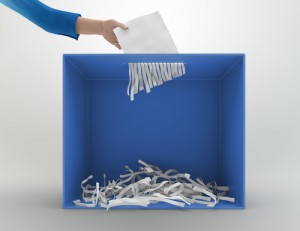SCOTUS blocks deadline extension for absentee ballots in Wisconsin

Image from Shutterstock.com.
The U.S. Supreme Court blocked a deadline extension on Monday evening for absentee voting in Wisconsin elections, ruling after the state’s supreme court barred the governor from postponing the Tuesday election.
Ruling 5-4, the Supreme Court said the ballots must be mailed and postmarked by election day on April 7.
A federal judge had “unilaterally ordered” an extension until April 13, even though the plaintiffs had not sought the extra time, the Supreme Court said in its per curiam opinion. The Supreme Court stayed that order.
“Extending the date by which ballots may be cast by voters—not just received by the municipal clerks but cast by voters—for an additional six days after the scheduled election day fundamentally alters the nature of the election,” the court said.
“By changing the election rules so close to the election date and by affording relief that the plaintiffs themselves did not ask for in their preliminary injunction motions, the district court contravened this court’s precedents and erred by ordering such relief.”
Justice Ruth Bader Ginsburg dissented in an opinion joined by Justices Stephen G. Breyer, Sonia Sotomayor and Elena Kagan.
Because of health risks posed by COVID-19, an “unprecedented number” of voters in Wisconsin—about 1 million more than in 2016—have requested absentee ballots, Ginsburg said. The surge has burdened election officials, leading to “a severe backlog” in ballots being mailed to voters.
“While I do not doubt the good faith of my colleagues,” Ginsburg wrote, “the court’s order, I fear, will result in massive disenfranchisement.”
The Supreme Court ruled after the Wisconsin Supreme Court held that Wisconsin Gov. Tony Evers could not use his emergency powers to delay the election, report the New York Times, Politico and USA Today.
Evers had ordered the delay Monday.
Although the election will proceed, several polling places may not open because poll workers are sick or fearful of showing up, according to the New York Times.



